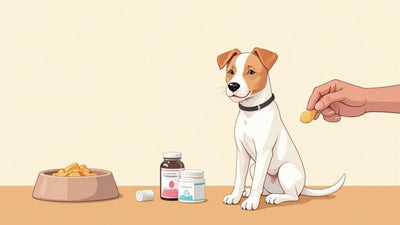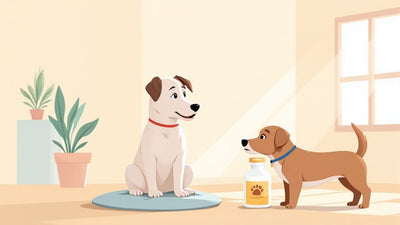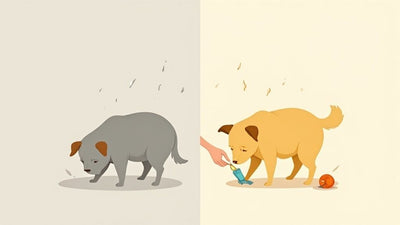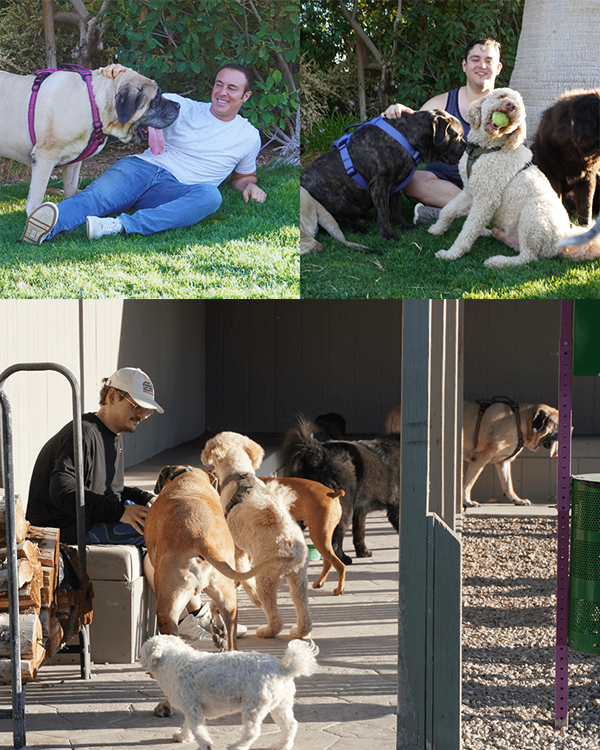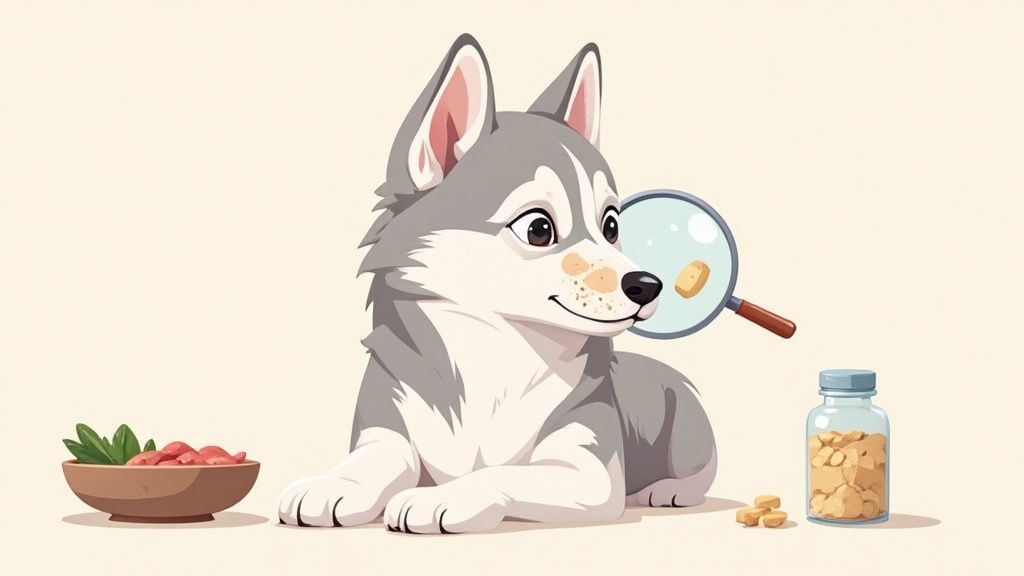
Zinc Deficiency in Huskies: A Guide to Symptoms, Causes & Support
It’s unsettling when you notice rough, scaly patches on your Husky's nose or see their beautiful fur thinning around their eyes. If this is happening, we want you to know you're not alone on this journey. These skin issues are often the first signs of zinc-responsive dermatosis. It’s a condition where a dog's body struggles to absorb this vital nutrient—something we see in stunning Nordic breeds like the Siberian Husky.
What Is Zinc Deficiency in Huskies?
When you notice something isn't quite right with your Husky's usually vibrant coat or healthy skin, it's natural to worry. What you're seeing is often more than just a rash; it’s a signal that their body needs a little extra support on the inside. What a zinc deficiency husky owner often faces is a condition called zinc-responsive dermatosis. The confusing part? It’s usually not about a lack of zinc in their diet. More often, it's about their body's unique inability to absorb the zinc that's already there.
We understand how puzzling this can be, especially when you’re already providing top-notch food. Think of it like a locked door: the zinc is there, but your Husky’s body doesn't have the right key to let it in and put it to work. This is a challenge many Husky families learn to manage, and understanding why it happens is the first step toward helping your friend feel more comfortable again.
A Genetic Predisposition
For many Siberian Huskies, the problem isn't what's in their food bowl—it's in their genes. They can be born with a genetic quirk that makes absorbing zinc a real struggle. Studies have shown that Huskies can inherit a form of this condition, all thanks to a trait that affects how their intestines process zinc. You can discover more insights about these genetic links on PMC. So, even with the best diet imaginable, their system might still need a helping hand to maintain healthy skin and a strong immune system.
We know you're doing everything right. Recognizing this is an inherited trait helps shift the focus from worry to supportive action. It’s about working with your dog’s unique needs, not against them.
Common Signs of Zinc Deficiency
Spotting the signs early can make all the difference. The changes might be subtle at first, but they tend to appear in specific areas. Paying close attention to your Husky's skin, coat, and even their energy levels can give you important clues.
To help you know what to look for, here's a gentle guide to the common signs.
Quick Guide to Common Signs of Zinc Deficiency
| Symptom Category | Specific Signs to Look For |
|---|---|
| Skin & Coat | Crusty, scaly, or thickened skin, particularly around the eyes, nose, and mouth. You might also notice it on their footpads or elbows. The coat can become dull, dry, and thin. |
| Paws | Thickened and hardened paw pads, which can sometimes crack and become uncomfortable. |
| Immune System | Seemingly constant secondary skin infections (bacterial or yeast) that are slow to clear up. |
| Behavior & Energy | General lethargy or a noticeable lack of interest in playing. Some dogs may also lose their appetite. |
Keep in mind that these symptoms can overlap with other health issues, so a conversation with your vet is always the best next step.
What's Next in This Guide
This guide is here to walk with you through it all. We'll move past the worry and into a place of confident action.
Here’s a quick look at what we'll cover to support you and your dog:
- Recognizing the Signs: We'll detail the specific physical and behavioral changes, from skin lesions to changes in energy.
- Understanding the Causes: A simple breakdown of why this happens, focusing on genetics and diet.
- Finding a Path Forward: Practical guidance on diagnosis, nutrition, and supplements.
Together, we can focus on what matters most: helping your Husky have more comfortable, happy, and healthy days.
Get Your FREE Dog Brain Health Guide

Get instant FREE access to today's top ways to help your best friend live a longer, healthier, happier life.
- 39 value-packed pages of expert insights
- Early-detection tips for cognitive decline
- Top brain-boosting superfoods
- Vet-approved mental sharpness strategies
- Fun IQ tests for your dog
Recognizing the Symptoms of Zinc Deficiency
It often starts small. You might notice your Husky's coat isn't quite as brilliant as it used to be, or maybe you see a bit of flaky skin you chalk up to dry weather. It's easy to miss these subtle changes during the hustle and bustle of daily life with your energetic companion.
That’s why learning to spot the early signs is so important. Catching a zinc deficiency in a Husky early on is the first and most meaningful step toward helping them feel like their happy, healthy selves again. These symptoms are more than just skin-deep; they can affect your dog's entire system.
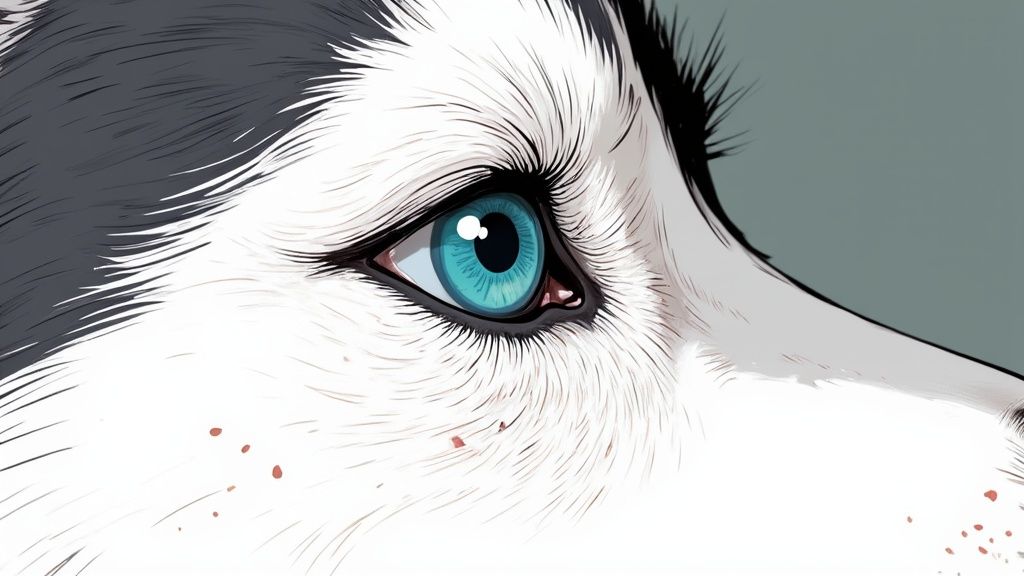
Classic Skin and Coat Issues
The most obvious signs usually appear on your Husky's skin and fur, especially in the areas where skin meets mucous membranes, like around the eyes and mouth. These spots are often the first to show they need support when zinc is in short supply.
Many families in your shoes first notice these tell-tale signs:
- Crusting and Scaling: Keep an eye out for thick, scaly, or crusty patches. They often pop up symmetrically around the mouth, nose, and eyes, sometimes creating a "spectacle-like" pattern.
- Hair Loss: The fur might start to thin out in those same places—around the face and ears. The coat can also lose its shine, feeling brittle or looking sparse.
- Pressure Point Lesions: You might find rough, thickened patches of skin on the elbows or other pressure points. These calluses can eventually crack and become uncomfortable.
Seeing your best friend uncomfortable is tough. Remember, these skin problems aren't just cosmetic. They're a clear signal that their body's internal defenses are struggling and need your help.
Paw Pad and Nail Problems
A Husky’s paws are their connection to every adventure, but a zinc deficiency can make every step feel less certain. Zinc is a key building block for keratin, the tough protein that makes up their paw pads and nails.
When zinc levels are low, you might see:
- Thickened, Cracked Paw Pads: Their pads can become unusually hard and thick, a condition called hyperkeratosis. This makes them brittle and prone to painful cracks, which can leave them open to infection.
- Brittle or Slow-Growing Nails: Just like their skin, their nails can be affected. They might become fragile and break easily or grow much slower than you're used to seeing.
Less Obvious Behavioral and Systemic Signs
While skin issues are the most visible sign of a zinc deficiency in a Husky, the problem often runs deeper. Zinc is involved in hundreds of bodily processes, from supporting the immune system to regulating metabolism. When it's lacking, other parts of the body feel the strain.
Try to connect these more subtle clues with any skin problems you're seeing:
- Recurring Infections: A challenged immune system can't fight off germs as well, leading to stubborn bacterial or yeast infections that just don't seem to clear up.
- Loss of Appetite: Your normally food-motivated Husky might suddenly become a picky eater or lose interest in meals entirely.
- Lethargy: If that famous Husky energy seems to have faded, or they're just not as excited about walks or playtime, it could be an internal sign that something is off.
It’s also good to know how different nutrients interact. For example, high levels of calcium can make it harder for the body to absorb zinc. To learn more, check out our guide on how a calcium deficiency in dogs can manifest, as some symptoms might look similar. Getting the balance right is everything.
Why Huskies Are Uniquely Prone to This Condition
It’s a frustrating spot to be in. You’re feeding your Husky a high-quality, balanced diet, doing everything by the book, yet those worrying skin problems still show up. We get it—the confusion and concern are completely understandable. But often, the problem isn’t what’s in their bowl, but what’s hardwired into their unique genetic makeup.
Understanding why your Husky might be struggling with a zinc deficiency can make a world of difference. It shifts the perspective from feeling helpless to realizing this is a manageable, breed-specific condition. This isn't your fault; it's just part of what makes a Husky a Husky, and you are their best advocate on this journey.
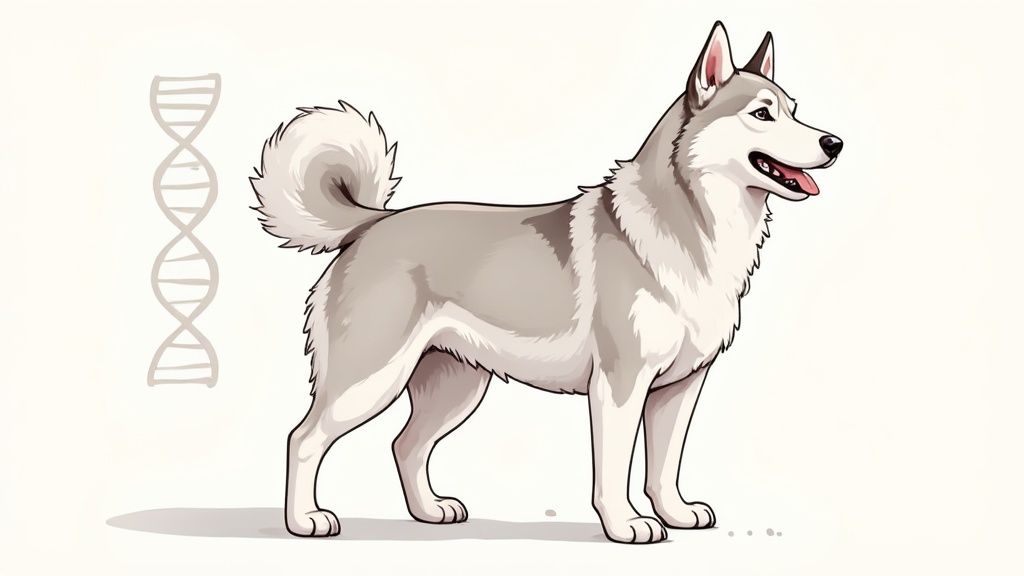
A Genetic Quirk in Northern Breeds
Siberian Huskies and their Arctic cousins, like the Alaskan Malamute, can inherit a trait that affects how their bodies absorb zinc from food. The official term is Zinc-Responsive Dermatosis Type I.
Let's put that in simpler terms. Imagine your dog's intestine is a busy train station with specific gates for different nutrients to pass through into the bloodstream. For some Huskies, the gate labeled "Zinc" is genetically a bit smaller or just doesn't work as efficiently. So, even when a whole trainload of zinc arrives from their meal, only a small trickle can actually get through to where the body needs it.
This genetic bottleneck means that a standard, healthy diet might not provide enough absorbable zinc to meet their body's demands. That's when you start seeing the downstream effects on their skin, coat, and immune system.
You're not alone in navigating this. This genetic predisposition means your Husky simply has special requirements. It’s all about learning their unique needs and giving them the right kind of support.
Dietary Roadblocks That Can Worsen the Problem
On top of their genetics, certain things in your Husky's food can act like roadblocks, making it even harder for them to get the zinc they need. Knowing what these are is a huge step in maintaining their health.
Here are the most common culprits that can interfere with zinc absorption:
- High Calcium Levels: Think of calcium and zinc as competitors. They use similar pathways to be absorbed in the gut, and when there's a flood of calcium, it often "wins" the race, leaving zinc behind. This can be an issue in raw diets heavy on bone or in kibbles with excessive calcium supplementation.
- Plant-Based Ingredients (Phytates): Many dog foods rely on grains, legumes (like peas and lentils), and soy. These plants contain compounds called phytates, which act like little magnets for minerals. Phytates can bind to zinc, creating a compound that the body can't break down or absorb, effectively locking the zinc away.
- Low-Quality Food Formulas: Some commercial dog foods just don't have enough bioavailable zinc to start with. They might use less effective forms like zinc oxide, which is much harder for a dog to process compared to better forms like zinc methionine.
How These Factors Combine
So, you have a Husky whose body already struggles to absorb zinc efficiently. Then, their diet might be unintentionally presenting more obstacles with high calcium or zinc-locking phytates.
It's a two-part puzzle: a genetic tendency meeting potential dietary hurdles. This explains why a diet that looks perfect on paper can still lead to a zinc deficiency in a Husky. The wonderful news? Once you understand both pieces of the puzzle, you can start making simple, powerful adjustments to help your dog get exactly what they need to thrive.
How Vets Diagnose Zinc Deficiency
Walking into the vet's office when your Husky is clearly uncomfortable can be stressful. You just want answers. The good news is that this process is a partnership between you and your vet, and understanding what to expect can make the conversation a lot less intimidating.
Pinpointing a zinc deficiency in a Husky isn't as simple as a single test. Since the symptoms—like crusty skin and hair loss—can look like many other skin issues, your vet's first job is to act like a detective, putting together all the clues from your dog's health.
The Initial Physical Examination
It all starts with a thorough hands-on exam. Your vet will get a close look at your Husky's skin and coat, focusing on those tell-tale areas where zinc deficiency often shows up: around the eyes, mouth, and nose, as well as on the elbows and paw pads.
They'll also ask you lots of questions. What’s your dog eating? Have their energy levels changed? What other little things have you noticed at home? Your story is so important, helping them connect the physical signs to a potential cause, especially given the breed's genetic predisposition.
Diagnostic Testing Options
If the physical exam raises a red flag for zinc deficiency, your vet will likely suggest a few ways to get a more concrete answer. There isn't just one path to a diagnosis; each test provides a different piece of the puzzle.
This infographic gives you a quick visual on the typical timelines for the most common diagnostic routes.
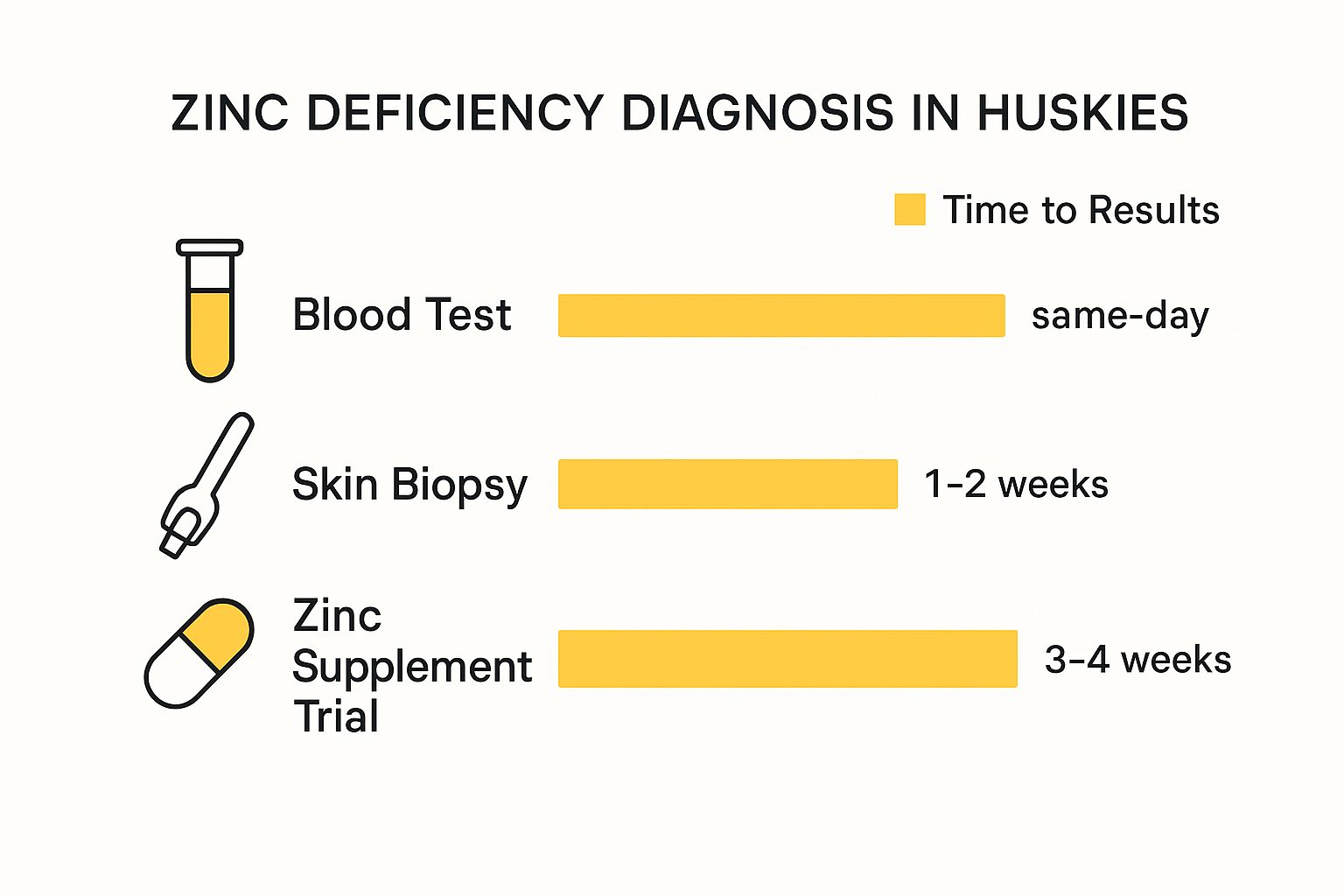
As you can see, getting clarity can range from a few hours to several weeks, depending on the approach.
Let's break down what each of these tests actually involves:
- Blood Tests: On the surface, checking zinc levels in the blood seems like the most logical step. The catch is that a blood test can sometimes be misleading. A dog’s blood zinc level doesn't always show how much zinc is actually getting into the cells where it's needed. A low reading is a strong clue, but a normal reading doesn't automatically rule out a deficiency.
- Skin Biopsy: This is often the most reliable way to get a definitive answer. Your vet will take a tiny sample of skin from one of the affected spots and send it to a lab. Under a microscope, a pathologist can see specific changes in the skin cells that strongly suggest "zinc-responsive dermatosis" and, just as importantly, rule out other look-alike conditions like allergies or autoimmune disorders.
- Supplementation Trial: Sometimes, the best way to diagnose the problem is to try supporting it. In a therapeutic trial, your vet will have you start your Husky on a specific zinc supplement. Then, you simply watch and wait. If the skin issues start to improve over a few weeks, that's a powerful confirmation that a zinc absorption problem was the culprit all along.
You are a key player on your dog's support team. Your detailed observations about how your Husky responds to any new support provide crucial information that helps your vet refine the long-term care plan.
Proper zinc levels are about more than just a healthy coat; they're tied to your dog's overall wellness. One study revealed that a significant 51% of dogs with a certain inflammatory disease also had low blood zinc, which was linked to shorter survival times. This really highlights how vital zinc is for their long-term health. You can read the full research about these findings here.

Support Your Dog's Brain Health with NeuroChew™
As mentioned in this article, NeuroChew is the first dog chew designed to support both cognitive function and healthy circulation. Perfect for dogs showing early signs of cognitive decline or for proactive brain health support.
Crafting the Right Nutrition and Supplement Plan
Once your vet has a firm diagnosis, the feeling of uncertainty starts to fade, replaced by a clear path forward. This is the part where you get to actively help your Husky start feeling better, and it's all about taking small, consistent steps to give them the nutrients they've been missing.
This isn't about a massive, complicated life change. It’s about making smart, targeted tweaks to their diet and adding the right kind of supplemental support. Every small win—seeing their skin look less irritated or feeling that soft, plush coat return—is progress worth celebrating.
Choosing the Right Zinc Supplement
The word "supplement" can bring a whole aisle of confusing bottles to mind, but you don't have to navigate it alone. Your veterinarian is your best guide here, and they'll pinpoint the exact type and dosage that fits your Husky’s specific needs. When it comes to a dog's digestive system, not all zinc is created equal.
The two forms your vet will likely bring up are Zinc Methionine and Zinc Sulfate.
-
Zinc Methionine: This is what's known as a "chelated" form. Basically, the zinc is attached to an amino acid. Think of that amino acid as a special key that helps unlock the door for zinc to pass easily through the intestinal wall and into the bloodstream. It’s highly absorbable and usually very gentle on the stomach.
-
Zinc Sulfate: This is a more straightforward, salt-based form that can also be very effective. However, it can sometimes be a bit harsh on an empty stomach. If your vet recommends this one, they’ll almost certainly tell you to give it with a meal to prevent any tummy trouble.
Your vet's choice will depend on your dog's specific condition and overall sensitivity. The aim is always to find the form that delivers the most benefit with the least amount of fuss.
A supplement isn't just a supplement; it's a tool. The right one helps bypass the genetic roadblock your Husky may have, ensuring this critical nutrient gets to where it’s needed most.
If you're interested in learning more about how different nutrients work together in your dog's body, you can explore our comprehensive guides on nutrition and supplements for dogs.
Making Smart Dietary Adjustments
While supplements are the main tool for supporting a zinc deficiency in a Husky, what goes into their food bowl every single day plays a massive supporting role. The goal is two-fold: focus on zinc-rich foods and be mindful of ingredients known to block zinc absorption.
Think of it as clearing a path so the zinc supplement can get to work without any obstacles.
Here are a few practical tips to keep in mind:
- Lean into Animal Proteins: Red meats, poultry, and fish (like sardines packed in water, not oil!) are fantastic, easy-to-absorb sources of natural zinc. Weaving more of these into your dog’s diet can provide a great foundation.
- Be Wary of Plant-Based Fillers: Many common dog food fillers like corn, soy, wheat, and legumes contain compounds called phytates. Phytates can bind to zinc in the gut and prevent it from being absorbed. Choosing a food with fewer of these can make a real difference.
- Keep an Eye on Calcium: Calcium is vital, but too much of it can be a problem. Calcium and zinc essentially compete for the same absorption pathways in the body. If a diet is excessively high in calcium (sometimes seen in raw diets with a heavy bone content), it can unintentionally interfere with your zinc supplementation efforts.
To help you get a clearer picture of the supplements, here’s a quick comparison of the options your vet might discuss.
Comparing Zinc Supplement Options for Your Husky
This table breaks down the two most common zinc supplements, helping you understand the choices your veterinarian will be considering for your Husky.
| Supplement Type | Key Characteristic | Best For |
|---|---|---|
| Zinc Methionine | Chelated (bound to an amino acid) for high bioavailability and gentle digestion. | Dogs with sensitive stomachs or those who need maximum absorption efficiency. |
| Zinc Sulfate | A common, effective salt-based form of zinc. | General supplementation, but must be given with food to avoid potential stomach upset. |
Ultimately, choosing the right supplement is a decision best made with professional guidance, but knowing the "why" behind their recommendation can make you a more confident partner in your dog's care.
Remember, this is a journey you're taking with your Husky. Every thoughtful change you make is another step toward more comfort and many more good days together.
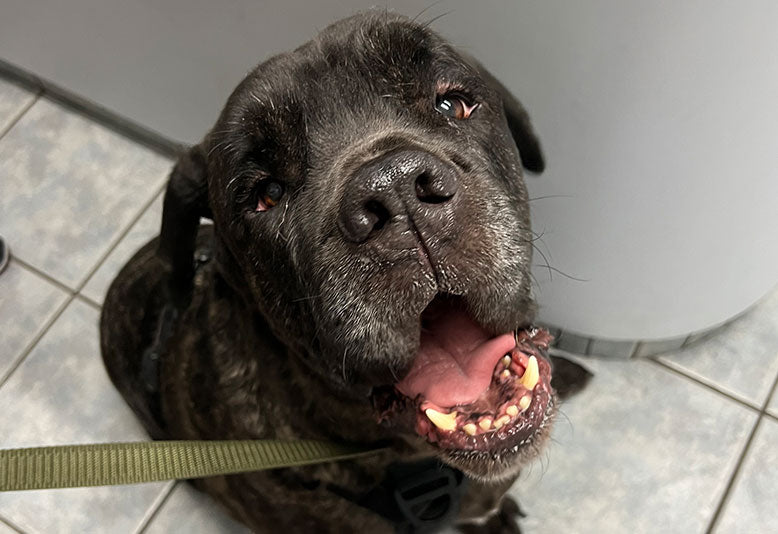
Real Results: How NeuroChew Helped Brutus Regain His Mental Clarity
Brutus was getting disoriented at night. After starting NeuroChew, he's more happy during the day and steady at night. He's back to his old self!
Long-Term Care for a Healthy and Happy Husky
Managing your Husky's zinc deficiency is less about a one-time fix and more about a new daily rhythm. Think of it as a commitment to their long-term well-being, one that deepens the bond you share by tuning into their specific needs. It’s all about creating more tail wags, playful pounces, and cozy evenings together.
The absolute key to progress? Consistency. The daily zinc supplement should become as routine as their morning walk or dinner time. Sticking to the plan your veterinarian laid out is what will keep their skin healthy and help prevent those uncomfortable flare-ups from returning.
The Importance of Regular Check-Ups
Think of your vet as your partner in this journey. Regular check-ins are so important for managing any long-term condition, and zinc deficiency is no different. These visits aren't just about ticking a box; they're your chance to track progress and fine-tune your approach together.
During these appointments, your vet will want to:
- Check their skin and coat: They have a trained eye for subtle changes, tracking how well lesions are healing and how the fur is growing back.
- Hear your observations: You're the one who sees your Husky every day. Have you noticed more energy? A better appetite? Your insights are incredibly valuable.
- Adjust the dosage: As your dog’s system stabilizes, the initial dose might need to be tweaked to a lower, long-term maintenance level.
These visits ensure the care plan is always perfectly matched to your Husky's current needs, giving you confidence and keeping your furry friend feeling great.
What to Do If Flare-Ups Occur
Even with the best care, you might occasionally see symptoms reappear. A little crustiness around the nose or a few new flaky patches can be disheartening, but please don't panic. This is often just part of the process.
If you spot a flare-up, the first step is to get in touch with your vet. They can help figure out if a temporary dose adjustment is needed or if an outside factor—like a new food or seasonal allergies—is playing a role. A robust immune system is also a powerful ally in preventing these setbacks. Giving their natural defenses a boost with immune supplements for dogs can provide an extra layer of support.
A flare-up isn’t a sign of failure. It's simply a signal from your dog's body that it needs a bit more help. The best response is always calm, proactive care.
It's worth remembering that zinc deficiency is a recognized health issue worldwide for both animals and people. It impacts more than just the skin and can even affect behavior. The good news is that these symptoms are almost always manageable with proper supplementation, which really speaks to the power of consistent, dedicated care. You can learn more about these findings on PMC.
Answering Your Questions
When you're navigating a health issue like zinc deficiency, it's natural to have questions. As a Husky owner, you want to do what's best for your dog, and that starts with having clear, reliable information. Let's tackle some of the most common concerns we hear.
Can I Give My Husky a Human Zinc Supplement?
We understand how tempting it can be to grab something from your own medicine cabinet, especially when you want to help your dog now. But please, don't give your Husky a human zinc supplement unless your vet specifically tells you to.
Here’s why: human supplements are formulated for human bodies. The dosages are often way too high for a dog and can easily lead to zinc toxicity. Even more concerning, some products contain other ingredients like xylitol, an artificial sweetener that is extremely dangerous for dogs. The safest and most effective path is always a supplement designed for canines, and recommended by your veterinarian.
How Long Until I See Improvement After Starting Supplements?
This is a journey that requires a bit of patience. Every dog is different, but you can generally expect to see the first positive signs in your Husky's skin and coat within about 4 to 6 weeks of consistent supplementation.
These initial improvements are often subtle—maybe a little less redness or the first signs of fluff returning to a bald patch. It can take several months for their coat to fully recover, so it’s important to stick with the plan. This is a marathon, not a sprint, and we're with you every step of the way.
The goal here is steady progress. Seeing those small changes is a sign you're on the right track to helping your dog feel much more comfortable.
Is Zinc Deficiency in Huskies a Condition That Can Be Cured?
That is a great question. For Huskies with the genetic form (Type I), zinc deficiency isn't "cured" in the way you'd cure an infection. It's better to think of it as a lifelong condition that can be managed incredibly well.
It’s not a disease to be eliminated, but rather a unique nutritional requirement that you'll support for the rest of your dog's life. The goal is to consistently supplement the zinc their body can't absorb properly on its own. With a solid management plan from your vet, a Husky with this condition can live a completely normal, happy, and adventure-filled life.
At Furever Active, our mission is to blend compassionate care with accessible science to support your dog's health. We're here to help you and your companion have more good days together. Learn more about our approach to canine wellness at https://fureveractive.com.
Share This Article

Support Your Dog's Brain Health with NeuroChew™
The first dog chew that supports both brain function and healthy circulation. Perfect for dogs of all ages.
- Enhances cognitive function & mental clarity
- Reduces anxiety without sedation
- Supports healthy blood circulation
- Made in USA with natural ingredients
60-Day Money-Back Guarantee • Free Shipping



